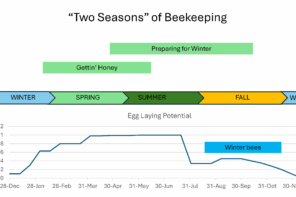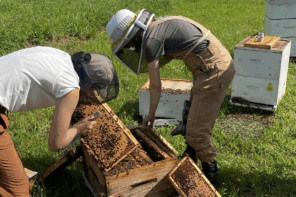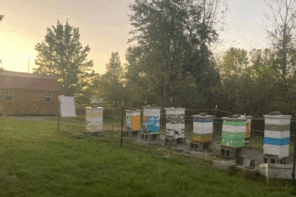Click Here if you listened. We’d love to know what you think. There is even a spot for feedback!
Read along below!
Minding Your Bees and Cues
Double or Nothing
By: Becky Masterman & Bridget Mendel
Newspapers are alive with headlines such as “The Rise of the Bee Thieves” or “The Great Hive Heist.” That’s because California almond pollination, that great February frenzy of bees and blossoms, has seen an 86 percent increase in hive theft between 2013 and 2024. And we’re here to say OMG.
As beekeepers keeping hives in mostly urban areas, we’ve definitely experienced a curious passerby who made the questionable choice to pop a hive lid, then, for obvious reasons, flung the telescoping cover on the ground and ran away. Then there was the intrepid disc golfer who absolutely insisted that he had the right to go into our hives and “help” us, followed by ranty emails about our management choices. This experience was a sort of emotional violation, a theft of, shall we say, autonomy? And of course, we think bear burglary is morally bankrupt but also kind of cute (Don’t hate us).
But this sinister nonsense amongst the almond trees! We are talking about thousands of hives stolen in 2023 alone, deeply affecting livelihoods and causing paranoia in the beekeeping community.
And who, exactly, are the thieves? Well, they are definitely beekeepers. As our interviewee Andy Strehlow, owner of Strehlow Bees, Inc., pointed out, “What non-beekeeper would steal bees?” They likely would not see the value, which, for him, is great: almond pollination is a check he can depend on, and the largest one of the year. One can build a family and a livelihood on almond pollination.

Over 2.5 million colonies of honey bees gather in the California almond orchards to meet their pollination needs. This photo shows acres of almonds in Stanislaus County. Photo Credit: Mel Machado
Beekeepers are used to taking some losses (mites, disease, and, increasingly, extreme weather like floods or fire) but this one is especially hard. While he is confident he can grow back any losses through sustainably splitting his bees every year, for Andy it’s a matter of ethics. Commercial beekeepers can be competitive, and even secretive, but they are some of the hardest working, passionate people on the planet. So, cheating the system is a deep betrayal in the community. Andy described working 12-hour days all season long, feeding, splitting, requeening—whatever it took to get whatever needed to get done, done. Stealing bees for a quick fix (successful thieves can rake in a quarter million in a matter of weeks) offends Andy more than it bothers him business-wise: this year he offered a $100,000 reward for information about the theft of approximately $34,000 worth of bees and equipment.

Almond pollination contracts have provided a financial lifeline to beekeepers, but also create financial incentives for hive theft. Photo Credit: Mel Machado
Andy described his preferred way of life: the South Dakota way. Homes and cars are left unlocked. If you stop by the side of the road, you leave your keys in your truck in case somebody needs to move it. Though he’s had bees stolen every year he’s been to California (anywhere from a few frames to 288 full colonies; “a whole orchard gutted”), he doesn’t report theft loss to his insurance company. Instead, he just maintains a “never give up attitude;” the thieves just make him want to come back bigger.
In classic beekeeper fashion, Andy refused to point fingers or share his conjectures about known bee thieves or even too many details about law enforcement’s response to such crimes. But one player he was more than eager to point a finger at is the current honey market. Driven down to all-time lows by “fictional honey”, beekeepers have no choice but to lean on, and into, pollination services. If we stopped allowing so much foreign and often fake honey into the American market, beekeepers could choose to stay put in their home state, foregoing the lure, and risks, of almond pollination.
All in all, Andy seemed surprisingly resigned to bee theft as just another challenge of the job, along with diminished habitat, pests, diseases, detrimental weather and tragically low honey prices. Despite these challenges, beekeeping is still absolutely worth it to Andy and his son Eythan who grew up in the bee yard and now helps run his 60,000 plus colony operation. He loves his bees (especially watching them grow in Spring) and even in the thieves he finds a little joke-on-them sweet side: a whole bunch of doubles were stolen from him and found in an orange orchard. Some were recently discovered and returned, each with a full third box of orange honey.
For more information
https://www.almonds.com/almond-industry/industry-news/hive-theft-peaked-2023
https://minnesotahoneyproducers.com/bear-damage-resources/
https://kmph.com/news/local/beekeeper-offers-100000-reward-for-return-of-stolen-hives-in-central-california
https://beeculture.com/usda-cost-of-pollination/











